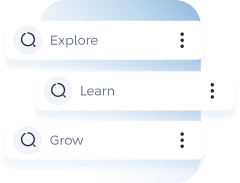
حدد بحثك
...

...


لطالما كانت الإدارة الفعالة جزءًا مهمًا من الحياة العملية للموظفين، حيث يرتبط الحافز والحماس والإنتاجية ارتباطاً وثيقاً بمدى كفاءة وفاعلية المدير. فالمدير ليس مسؤولا فقط عن مخرجات وتقارير الادارة، بل يتحمل أيضاً مسؤولية دعم الموظفين وتمكينهم من خلال فهم احتياجاتهم، ودوافعهم، وتوجيههم في المجالات التي يحتاجون إلى تطوير فيها، فأفضل القادة هم من يتواصلون بشكل فعال مع موظفيهم ولديهم مستويات عالية من الذكاء العاطفي. إذن، ما هي بعض خصائص المدير الفعال وكيف يجب عليه تحفيز وتمكين موظفيه وأعضاء فريقه لتحقيق أفضل النتائج؟ يركز هذا البرنامج التدريبي على أساليب الإدارة الفعالة والمهارات الأساسية للمديرين، فضلاً عن استعراض مفاهيم التوجيه وأساليبه وكيفية تحديد الأهداف الذكية للموظفين، بالإضافة إلى التعرف على أساليب التحفيز ومعوقاته، ومعالجة التحديات التي تواجه المدراء لزيادة قدرتهم على تمكين الموظفين وتوجيههم نحو تحقيق أهداف المنظمة المرجوة.
لطالما كانت الإدارة الفعالة جزءًا مهمًا من الحياة العملية للموظفين، حيث يرتبط الحافز والحماس والإنتاجية ارتباطاً وثيقاً بمدى كفاءة وفاعلية المدير. فالمدير ليس مسؤولا فقط عن مخرجات وتقارير الادارة، بل يتحمل أيضاً مسؤولية دعم الموظفين وتمكينهم من خلال فهم احتياجاتهم، ودوافعهم، وتوجيههم في المجالات التي يحتاجون إلى تطوير فيها، فأفضل القادة هم من يتواصلون بشكل فعال مع موظفيهم ولديهم مستويات عالية من الذكاء العاطفي. إذن، ما هي بعض خصائص المدير الفعال وكيف يجب عليه تحفيز وتمكين موظفيه وأعضاء فريقه لتحقيق أفضل النتائج؟ يركز هذا البرنامج التدريبي على أساليب الإدارة الفعالة والمهارات الأساسية للمديرين، فضلاً عن استعراض مفاهيم التوجيه وأساليبه وكيفية تحديد الأهداف الذكية للموظفين، بالإضافة إلى التعرف على أساليب التحفيز ومعوقاته، ومعالجة التحديات التي تواجه المدراء لزيادة قدرتهم على تمكين الموظفين وتوجيههم نحو تحقيق أهداف المنظمة المرجوة.

البنوك
الأوراق المالية
التأمين
التمويل

أبحاث جهة البيع
إدارة الضمان +111
أبحاث جهة البيع
إدارة الضمان
إدارة الضمان
إدارة الضمان
إدارة المحافظ
إدارة المحافظ
إدارة المحافظ/ الصناديق
إدارة المخاطر
إدارة المخاطر
إدارة المخاطر
إدارة المخاطر
إدارة المرافق
إدارة المرافق
إدارة المرافق
إدارة المرافق
إدارة المشاريع
إدارة المشاريع
إدارة المشاريع
إدارة المشاريع
استراتيجية الشركات
استراتيجية الشركات
استراتيجية الشركات
استراتيجية الشركات
إعداد التمويل
إعداد نماذج الائتمان
الاستشارات المالية
الاستشارات المالية
الاستشارات والبحوث الشرعية
الاستشارات والبحوث الشرعية
الإعداد والهيكلة
الاكتتاب
الإكتوارية
الالتزام والتدقيق الشرعي
الالتزام والتدقيق الشرعي
الالتزام ومكافحة غسل الأموال وتمويل الإرهاب
الالتزام ومكافحة غسل الأموال وتمويل الإرهاب
الالتزام ومكافحة غسل الأموال وتمويل الإرهاب
الالتزام ومكافحة غسل الأموال وتمويل الإرهاب
الأمن السيبراني
الأمن السيبراني
الأمن السيبراني
الأمن السيبراني
الائتمان
الائتمان
التحصيل والاسترداد
التحصيل والاسترداد
التحصيل والاسترداد
التسويق
التسويق
التسويق
التسويق
الحفظ
الخزانة
الذكاء الاصطناعي وعلم البيانات
الذكاء الاصطناعي وعلم البيانات
الذكاء الاصطناعي وعلم البيانات
الذكاء الاصطناعي وعلم البيانات
العمليات البنكية
العمليات التمويلة
العمليات الخاصة بوثائق التأمين
العناية بالعملاء
العناية بالعملاء
العناية بالعملاء
العناية بالعملاء
القانونية
القانونية
القانونية
القانونية
المالية
المالية
المالية
المالية
المبيعات والتوزيع / الوسطاء
المراجعة الداخلية
المراجعة الداخلية
المراجعة الداخلية
المراجعة الداخلية
المشتريات
المشتريات
المشتريات
المشتريات
المطالبات
المعاينة/ تقدير الخسائر
المقاصة والمطابقة والتسويات
المقاصة والمطابقة والتسويات
المقاصة والمطابقة والتسويات
الموارد البشرية
الموارد البشرية
الموارد البشرية
الموارد البشرية
الوساطة في عقد الصفقات
تحليل التصنيف الائتماني
تطوير المنتجات
تطوير المنتجات
تطوير المنتجات
تطوير المنتجات
تقنية المعلومات
تقنية المعلومات
تقنية المعلومات
تقنية المعلومات
تقييم الضمان/ الأصول
تقييم الضمان/ الأصول
حوكمة الشركات
حوكمة الشركات
حوكمة الشركات
حوكمة الشركات
علاقات المستثمرين
علاقات المستثمرين
علاقات المستثمرين
علاقات المستثمرين
عمليات إعادة التأمين / تغطية التأمين بأثر رجعي
عمليات التأمين الصحي
قنوات تقديم الخدمة

قيادة الأعمال وإدارة الأفراد

لا يوجد

المحاضرة
حالات دراسية +3
المحاضرة
حالات دراسية
العصف الذهني
فرق الحوار
التمارين والواجبات

اختبار قبلى
اختبار بعدى
اختبار قبلى
اختبار بعدى
وهذا يوفر لك الفرصة لاختيار الأوقات المتاحة التي تناسبك للمشاركة في برنامجنا. تمثل هذه الأوقات فترات نكون خلالها على استعداد للترحيب بكم وتقديم المساعدة والتوجيه.